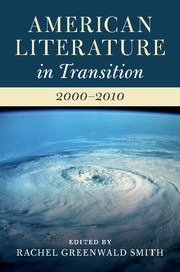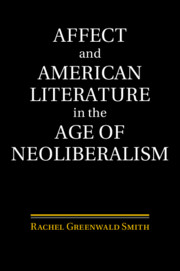
American Literature in Transition, 2000–2010
$129.00 USD
Part of American Literature in Transition
- Editor: Rachel Greenwald Smith, Saint Louis University, Missouri
- Date Published: December 2017
- availability: This ISBN is for an eBook version which is distributed on our behalf by a third party.
- format: Adobe eBook Reader
- isbn: 9781108548656
Find out more about Cambridge eBooks
$
129.00 USD
Adobe eBook Reader
Other available formats:
Hardback
Looking for an inspection copy?
This title is not currently available on inspection
-
American Literature in Transition, 2000–2010 illuminates the dynamic transformations that occurred in American literary culture during the first decade of the twenty-first century. The volume is the first major critical collection to address the literature of the 2000s, a decade that saw dramatic changes in digital technology, economics, world affairs, and environmental awareness. Beginning with an introduction that takes stock of the period's major historical, cultural, and literary movements, the volume features accessible essays on a wide range of topics, including genre fiction, the treatment of social networking in literature, climate change fiction, the ascendency of Amazon and online booksellers, 9/11 literature, finance and literature, and the rise of prestige television. Mapping the literary culture of a decade of promise and threat, American Literature in Transition, 2000–2010 provides an invaluable resource on twenty-first century American literature for general readers, students, and scholars alike.
Read more- Offers a broad account of the literary culture of the 2000s, making it a a useful volume for teaching twenty-first century literature or for scholars needing an overview of the decade's most important developments
- Organized according to thematic, formal, and institutional clusters, allowing scholars and students to find work on a few major thematic developments of the decade, such as awareness of ecological crisis
- Chapters are brief, free of jargon, and argument-driven, making it an engaging read for specialists and non-specialists alike
Customer reviews
Not yet reviewed
Be the first to review
Review was not posted due to profanity
×Product details
- Date Published: December 2017
- format: Adobe eBook Reader
- isbn: 9781108548656
- contains: 5 b/w illus.
- availability: This ISBN is for an eBook version which is distributed on our behalf by a third party.
Table of Contents
Introduction Rachel Greenwald Smith
Part I. Formal Transitions:
1. 'Post'-ethnic form Elda María Román
2. Gender, sexuality, and new queer forms T. Jackie Cuevas
3. Formally conventional fiction Adam Kelly
4. Literary genre fiction Andrew Hoberek
5. New wave fabulism and hybrid science fictions Kate Marshall
6. The televisual novel Phillip Maciak
Part II. The Return of Authenticity:
7. Neorealist fiction Lee Konstantinou
8. Memoir Daniel Worden
9. Historical fiction and the end of history Mitchum Huehls
10. Literature after 9/11 Georgiana Banita
11. The neuronovel Stephen J. Burn
Part III. Digital Revolutions:
12. Information Lindsay Thomas
13. Electronic literature Brian Kim Stefans
14. Social networks Scott Selisker
15. Conceptual writing Jennifer Ashton
Part IV. Transnational Currents:
16. Financialization Annie McClanahan
17. Borders and migrations Emilio Sauri
18. War on terror Timothy Melley
Part V. The Ecological Turn:
19. New directions in ecocriticism Janet Fiskio and Sophia Bamert
20. Climate change fiction Matthew Schneider-Mayerson
21. Ecopoetics Jonathan Skinner
Part VI. Institutional Shifts:
22. Little magazines, blogs, and literary media Evan Kindley
23. Publishing in the age of Amazon Loren Glass
24. Creative writing, cultural studies, and the university Eric Bennett
Afterword: the 2000s after 2016 Rachel Greenwald Smith.
Sorry, this resource is locked
Please register or sign in to request access. If you are having problems accessing these resources please email [email protected]
Register Sign in» Proceed
You are now leaving the Cambridge University Press website. Your eBook purchase and download will be completed by our partner www.ebooks.com. Please see the permission section of the www.ebooks.com catalogue page for details of the print & copy limits on our eBooks.
Continue ×Are you sure you want to delete your account?
This cannot be undone.
Thank you for your feedback which will help us improve our service.
If you requested a response, we will make sure to get back to you shortly.
×
